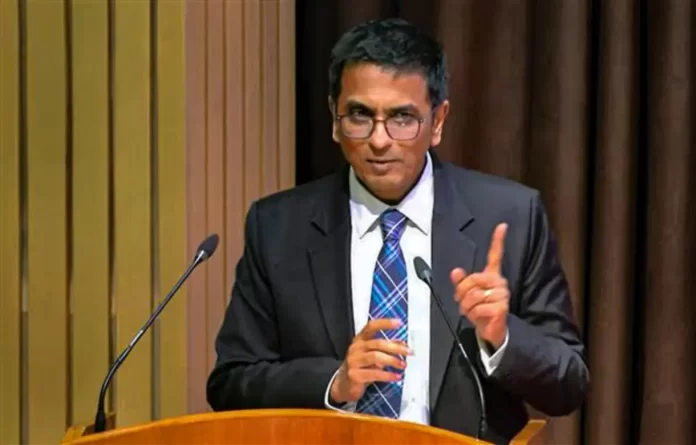Chief Justice of India Justice DY Chandrachud on Tuesday stressed the need to adopt a ‘green’ lifestyle to reduce carbon emissions, stating that climate change could no longer be ignored.
Speaking during a foundation stone-laying ceremony for trial court buildings in Karkardooma, Shastri Park and Rohini in the capital, the CJI said Delhi experienced the hottest-recorded weather in 2024.
Noting that the capital experienced two heatwaves followed by record-breaking rain in a single day, the CJI said the infrastructure must reflect the reality the people were living in.
He asked people to incorporate a green lifestyle in their daily lives to reduce carbon emissions, adding that he was delighted to know that the new buildings will focus on heat-island mitigation and reduce environmental footprint.
The CJI referred to an 18th century case in which one Rama Kamati’s servant was subjected to custodial torture to confess his employer’s criminality. Even Kamati was convicted in the case and he later died in prison.
The CJI said the country’s legal and constitutional system was fundamentally premised on the virtues of justice, liberty, equality and fraternity. Courts were the guardians of these foundational virtues. The judges upheld these virtues by enforcing rights-based substantive laws and fairness-based procedural laws.
The CJI further said that in the case related to Rama Kamati, it later came to light that the evidence against the convict was fabricated.
He said the story of Rama Kamati was a reminder that rough, ready and handy justice was an anathema to the rule of law and procedural guarantees, which the people have come to cherish. The foundation of a court must be sound — both in its structural and philosophical capacity. It must subserve no might but the Constitution and be in service of no one but the litigants, he added.
The CJI said that courts were not merely sights of sovereign power, but also essential public service providers.
Laying down the foundation stone, the CJI said that the court premises, like all buildings, were not just made of bricks and concrete. They are made up of hope. Courts were made to realise the virtues of justice and the rule of law. Every case being filed before the courts was done with a hope for justice.
He said investing in the safety, accessibility and comfort of judges, lawyers and litigants did not just result in an efficient system, but it resulted in a just and inclusive system.
The CJI said that new complexes will enhance the efficiency of the courts and reduce the pendency of cases.
Calling the courts repository of precedents and an accumulation of social histories, he said the judges applied the present law, drawing upon the past law to shape the future law. Through their rulings, they bridged historical legal principles with contemporary issues, crafting the legal landscape for tomorrow, he added.
Delhi Lieutenant Governor VK Saxena, Supreme Court judges Justice Sanjiv Khanna and Justice Hima Kohli, Delhi High Court Acting Chief Justice Justice Manmohan and Delhi Minister Atishi were present on the occasion.


